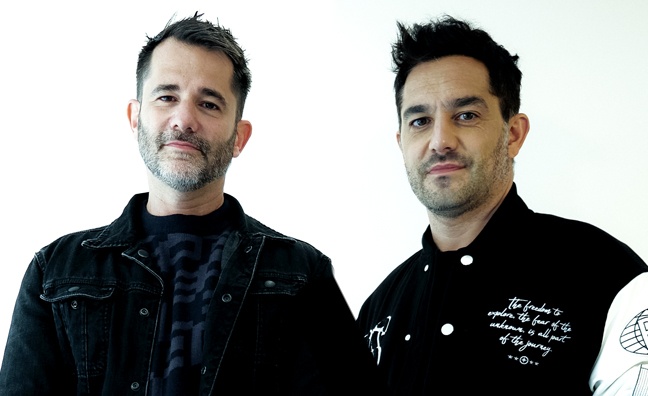This year, there’s more music industry interest than ever before in the UK’s prospects at the Eurovision Song Contest, with Tap Music & Parlophone joining forces behind UK hopeful Sam Ryder. In a special digital cover interview, Music Week meets Ben Mawson, Ed Millett, Mark Mitchell, Nick Burgess and Ryder himself to hear their plan to change the narrative around Eurovision and send the singer into orbit when he performs Space Man in Turin this weekend…
WORDS: JAMES HANLEY
PHOTOS: BEX DAY
After years of treating the Eurovision Song Contest like a joke, the United Kingdom has found itself the butt of it. Not since 1997 – days after Tony Blair’s New Labour swept to a landslide general election victory – has the UK come out on top at Eurovision. Worse, it hasn’t even made the left-hand side of the board in over a decade.
So when singer-songwriter James Newman’s Embers became only the second UK entry to score the dreaded ‘nul points’ last year (mirroring 2003 wooden spoon winners Jemini), it spurred a group of influential players in the British music industry into action. Tap Music's Ben Mawson and Ed Millett – Music Week Awards Managers Of The Year for two consecutive years – revealed they were leading the bid to reverse the UK’s fortunes and find a viable contender for the 2022 Eurovision crown.
Supported by an all-star cast including Dua Lipa, Elton John, Lana Del Rey, Andrew Lloyd Webber and Nile Rodgers, the powers that be settled on their chosen one for 2022: Parlophone-signed singer-songwriter Sam Ryder. One of the biggest UK artists on TikTok, with more than 12 million followers, over 100m likes and the most total followers for two years running, the heavenly-voiced social media sensation first rose to prominence during lockdown, when his viral covers attracted the attention of superstars such as Justin Bieber, Sia and Alicia Keys.
“His voice is just from another planet,” gushes Mawson. “And, of course, he had that huge following on TikTok. He seemed to have a personality and it was proven when we met him; he was charming and endearing and I guess that’s why he's got that huge following. He didn't say yes straight away – we had a bit of an effort persuading him, but he has done such a good job so far.”
Indeed, the amiable Essex native has been a natural on the promo trail as he prepares to carry the hopes of the nation on his shoulders at the May 14 ceremony, which is being held at PalaOlimpico in Turin following Måneskin's seismic triumph in Rotterdam last year.
“I’d never thought I'd be representing the UK at Eurovision for one moment in my whole life,” he tells Music Week. “It wasn't until January when I got a call from the BBC, saying they’d heard my song, Space Man, which I'd written a year-and-a-half ago, so god knows how it had done the rounds in the background for that long. And they asked me if I'd be up for singing at Eurovision.”
The track itself was at least half the appeal. Co-written in lockdown with established hitmakers Amy Wadge and Max Wolfgang, Space Man has been warmly received by critics and was named as Scott Mills' Record Of The Week on BBC Radio 2. It has more than 4.5m plays on Spotify, where Ryder has 1,157,795 monthly listeners. Parlophone UK co-presidents Nick Burgess and Mark Mitchell suggest Mawson’s overtures came just at the right time.
“When Ben and Tap came to us about Eurovision, it was about Space Man,” says Burgess. "If it wasn't, I don't think we'd have done it. It is a true, authentic piece of music and we saw Eurovision as a platform for the song and for the artist – there was no overthinking of it. Space Man was coming out anyway, so we haven't altered the plan in any way shape or form.”
“We knew that Sam was of such quality and that track was really special,” nods Mitchell. “We always had – and still have – huge hopes for that song and we were holding it back for the right time. So when Ben came along, it all fitted into the plan.”
A truly global phenomenon, last year’s Eurovision was watched by 183m people worldwide (viewing figures topped 200m in 2016), while the BBC’s coverage attracted over 7m viewers domestically. This year, the show will also be live streamed on TikTok. With factors from Brexit to bloc voting among neighbouring countries commonly cited for the UK’s dismal recent Eurovision record, Tap’s Mawson made it clear from the start that the time for excuses from the five-time winners was now over (“Ultimately we can’t blame politics,” he said back in October).
In recent years, Mawson and Millett have enjoyed success with the likes of Dua Lipa, Lana Del Rey and Ellie Goulding, but are now turning their attention to help restore the UK’s Eurovision pride. Here, in the first part of our Eurovision cover interview, they explain why…
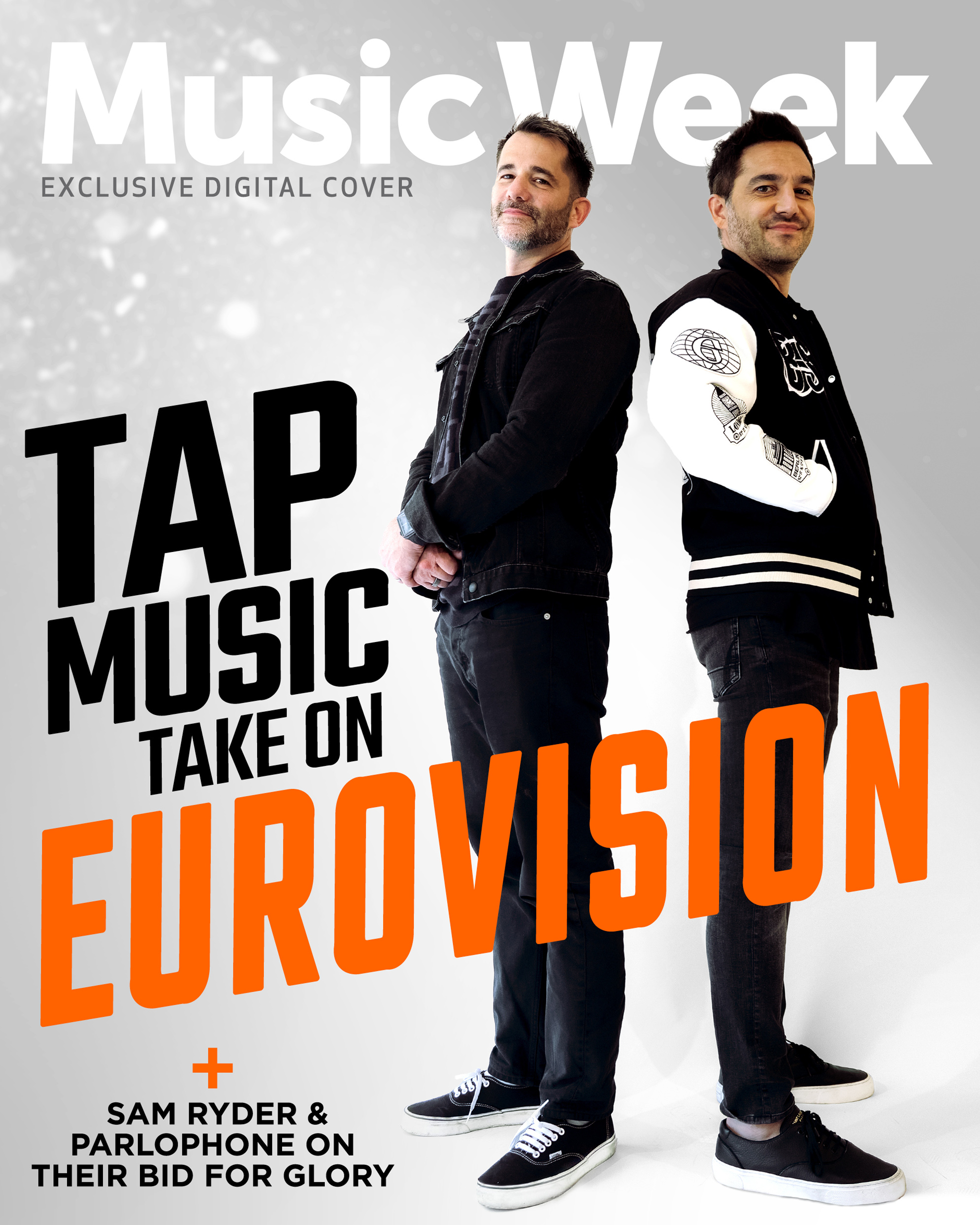
At what point did you decide Eurovision was something you wanted to get involved in?
Ben Mawson: “We got an email from the BBC after last year's Eurovision, asking if one of our younger artists would be part of it. And the instant response from Ed, without us discussing it, was no. But I'd been to the Eurovision Song Contest in 2016 or '17, when my wife [television host and actress Mirjam Weichselbraun] presented it in Austria and I'd seen what an amazing cultural phenomenon it was. Having done a bit of research, I found out it was the biggest music TV on the planet – 200 million viewers – which surprised me, so I talked about it with Ed.”
Ed Millett: “You were sort of apologetic! But I was like, ‘Sounds great, let's do it.’”
BM: “Actually, my first step had been to ring the number at the bottom of the email and say, ‘What's your process? There is so much good pop music that comes out of this country, why is the platform not being properly exploited?’ Måneskin have had huge, very credible, commercial success off the back of Eurovision and yet we'd done badly – very badly for a couple of years, but pretty badly for quite some time. And I just wondered why that was and thought it would be a fun challenge. I spoke to two guys from BBC Studios who worked on the show – Andrew Cartmell and Lee Smith. One thing led to another and we spoke to people further and further up the chain at the BBC. We weren't really pitching for the job, I was just giving feedback on ways in which I thought we could do better and it culminated after a few Zooms with them saying, ‘Would you be up for picking the contestant?’ So we took it on and it was a very daunting task.”
EM: “There was no real time, that was what was frightening. We had to go from not having anything, to having confidence in this person in basically three months – along with knowing what everyone's perception about it was. So there was a big industry PR mission to get people to not have the same reaction as I did when we got asked. Step one was just talking to people and saying, ‘This is a great opportunity.’”
Where do you think the UK has been going wrong when it comes to Eurovision?
BM: “The main thing I would say is the UK – and me included – has traditionally not taken it very seriously. A lot of people I know have seen it as a fun bit of TV, but I haven't always considered it as a serious music platform and maybe it hasn't always been that. But certainly around Europe, generally, everyone is taking it extremely seriously. In Iceland, 95% of the population watches the final, in Sweden, it's 75%, and they all spend a lot of money on it and really want to win. I don't think we've ever necessarily gone into it with that attitude.”
EM: “Even the commentary from the BBC side is generally pithy and has a bit of comedy about it, and that's the general British attitude towards it. Why it's gone that way, I don't know – just because it's easier to dismiss something that we don't win and it becomes self-fulfilling?”
BM: “It's always been said that the UK is not a very popular country and I was thinking it'd be interesting to make a documentary about why people don't like the UK. Brexit, of course, probably hasn't helped with the European neighbours. But the more we got into it, the more we realised that maybe it was less about politics and more about us not taking it seriously.”
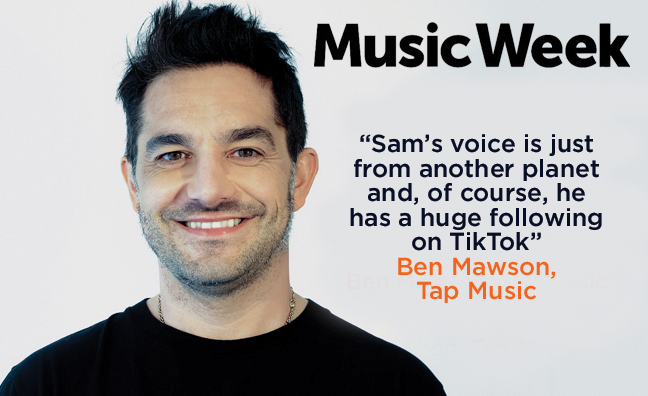
How did the selection process work?
BM: “There wasn't really a judging team, we did it internally. The first thing we did was talk to as many labels and significant people in the music business as we could, and there was a surprisingly positive reception. Simon Cowell, Andrew Lloyd Webber and a lot of the major label heads. They seemed to get it and then we had a phone call from Chris Price at BBC Radio 1. He was very engaged and said, ‘Scott Mills is a huge Eurovision fan and would like to support it.’ And he has been absolutely incredible. He gave us real insight into what worked and what didn't at Eurovision, because it's a pretty unique competition. Traditional, straight up pop songs just don't work. There's a formula with the artists, the stage show, the type of song and – most important of all – the quality of the singer. So there were a lot of boxes to tick, which not all pop stars do tick – however successful. Picking someone because they're a big name is just not going to work.”
EM: “Time was so short, it became a much more internalised process. We had a PR job to do to get people to submit artists. Erin [Strange, Tap A&R] sent us Sam, amongst others. It became quite similar to how we might find an artist.”
BM: “One of the thoughts initially was that maybe we should form some kind of supergroup. One label in particular, which I won't name, was particularly enthusiastic about it and wanted to combine a few significant British artists, some of whom were up for it, some of whom weren't. That was where it started, but we were getting songs in which we thought fit. The thing about Eurovision is that it's about someone who can perform live on the night, because it is a live vocal, but it's also a song contest, so the song has got to be right. Then you've got the personality aspect, so there's a combination of factors. Sometimes songs were winning and sometimes particular artists were winning. But with Sam, we had so many boxes ticked.”
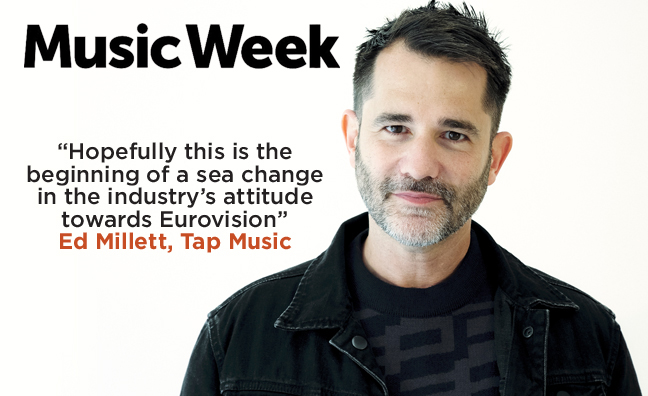
Is your involvement in Eurovision a one-off or would you be up for doing it again?
BM: “I'm not sure about that; I guess that's up to the BBC. It's had its stressful moments, but it's been fun and a different sort of challenge. I guess that our main hope is that this is the start of the country taking it seriously every year, us starting to get good results and it being a really great platform for British artists.”
EM: “Hopefully, it helps Sam move on to the next stage of his career and that, in itself, will encourage talent for the future to want to consider it. Hopefully it's the beginning of a sea change in our attitude towards it. If we're involved in that, it's certainly exciting, but we'll have to see…”
When Mawson reached out to Parlophone’s Nick Burgess and requested a meeting, he deliberately omitted the subject matter.
“I had to tell him face to face in case he wouldn't meet me,” grins Mawson. “He said, ‘I'm on holiday. But if you really need to meet, I'll meet you for lunch.’ I hadn't seen him in a while so we chatted about a load of other stuff and then I threw it in, but he came on board. The whole label has been brilliant.”
Burgess is at pains to point out Eurovision is just one part of a bigger campaign for Ryder, who released his debut EP The Sun’s Gonna Rise in 2021.
“We built up four singles into the EP, did several tours and live shows and really built him as an artist,” he explains. “We didn't want to take anything for granted with his social media, that was just a bonus. We're not going to use that as a shortcut, he still has to do the hard work. We know how transient social media can be and we didn't want to rely on that as his reason for success.”
In this Q&A, Burgess and co-president Mark Mitchell delve deeper into Parlophone’s plans for Ryder – for Eurovision and beyond…
Just how popular is Sam going into Eurovision?
Mark Mitchell: “It's an interesting one because, obviously, he's got such a huge number of followers but you can quite often be cynical about any artist with a big following on social media. It doesn't necessarily turn into streams and that's always part of the challenge. But it proves that the artist has a genuine connection with people.”
Nick Burgess: “What it proved to us was that he was able to build a community of people that he could communicate with. Therefore, there was a community of people that we could communicate with. Social media is quite a light touch relationship sometimes, so our job is to now turn those people into genuine fans of his music.”
Considering Eurovision isn’t always the happiest hunting ground for UK artists, what convinced you this was a good move for Sam?
NB: “We see this as a really great promo opportunity, no different to any other big TV show in terms of what you use it for. Måneskin are not seen as Eurovision Song Contest winners, they're seen as rock stars and that's what we believe we can do with this. We know the pitfalls of this show and, if it goes well, it's a chance to grow his fanbase and we believe that whatever happens he will prove himself. But if, because of the politics of the show, it doesn't overperform then we just carry on with the plan that we already had in place, which is consistent releases of quality music.”
MM: “We have other music lined up, ready to go. We have already planned what's coming next.”
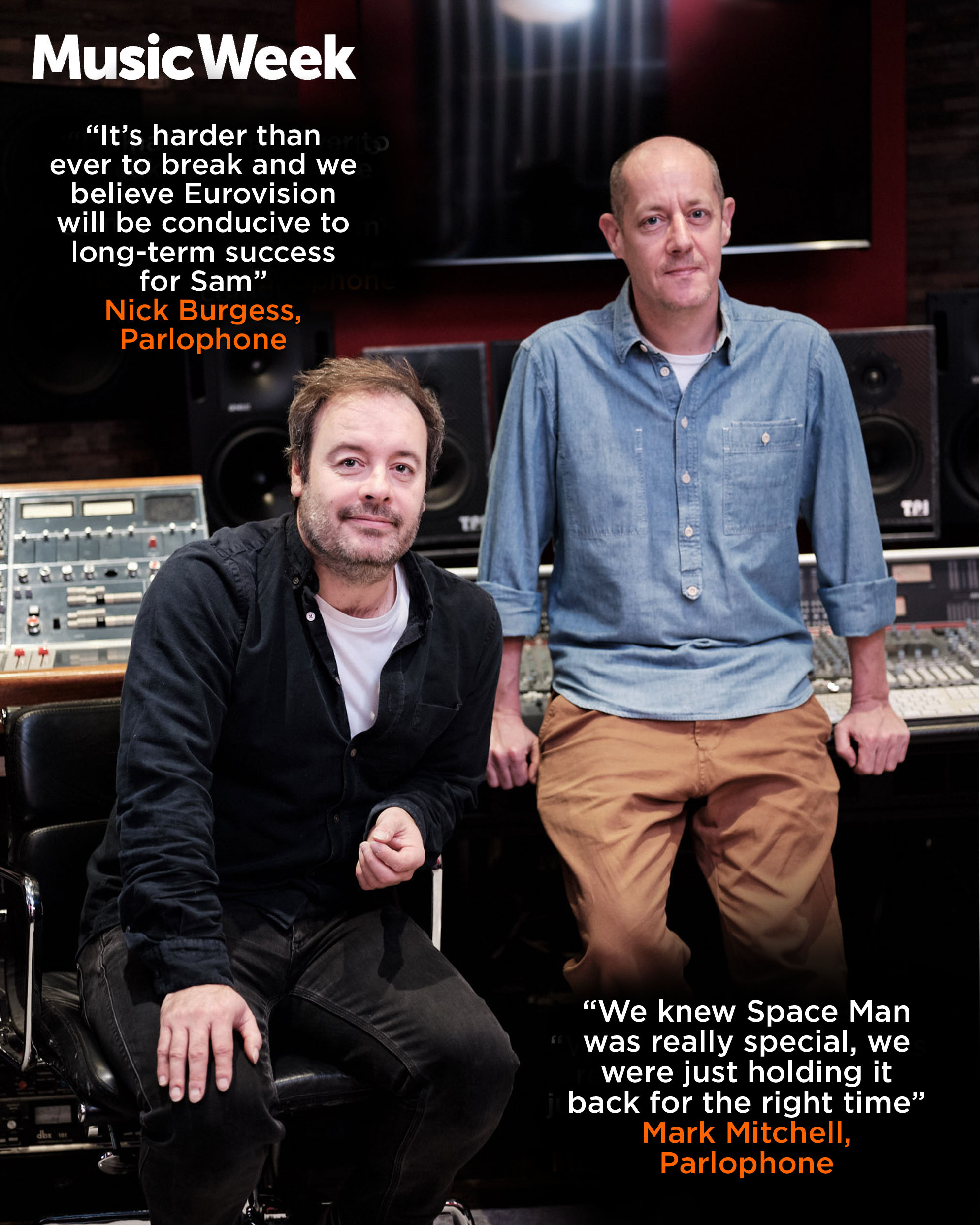
What has Måneskin's 2021 triumph done to alter people's perception of Eurovision?
NB: “Some people win the Eurovision Song Contest and that is all anyone says about them. Måneskin proved that if you are a genuinely brilliant act with great songs and great star quality, then your talent outweighs that fact. They actually gave it a lot of credibility and that was one of the real turning points for Sam and us – they didn't let the Eurovision narrative dominate.”
Assuming it does go well, what can the exposure do for Sam’s career?
NB: “It can open the doors we need for an unconventional artist. This shouldn't be Sam's biggest moment, we hope it's just a platform and the start of a huge career in a difficult, fractured landscape for artists. Globally, in 2022, it's harder than ever to break and we believe this is one thing that hopefully will be conducive to long-term success.”
How do you reflect on our Eurovision efforts as a nation in recent years?
MM: "We've spent a lot of time looking at the recent history of Eurovision, and if you look at the artists who come Top 3, they're there for a reason. They're either great songs, brilliant performances, or genuinely great artists. Yes, there is a novelty factor about some entries, but they don't come in the Top 10. It is genuinely a contest about the best song and the best performance.”
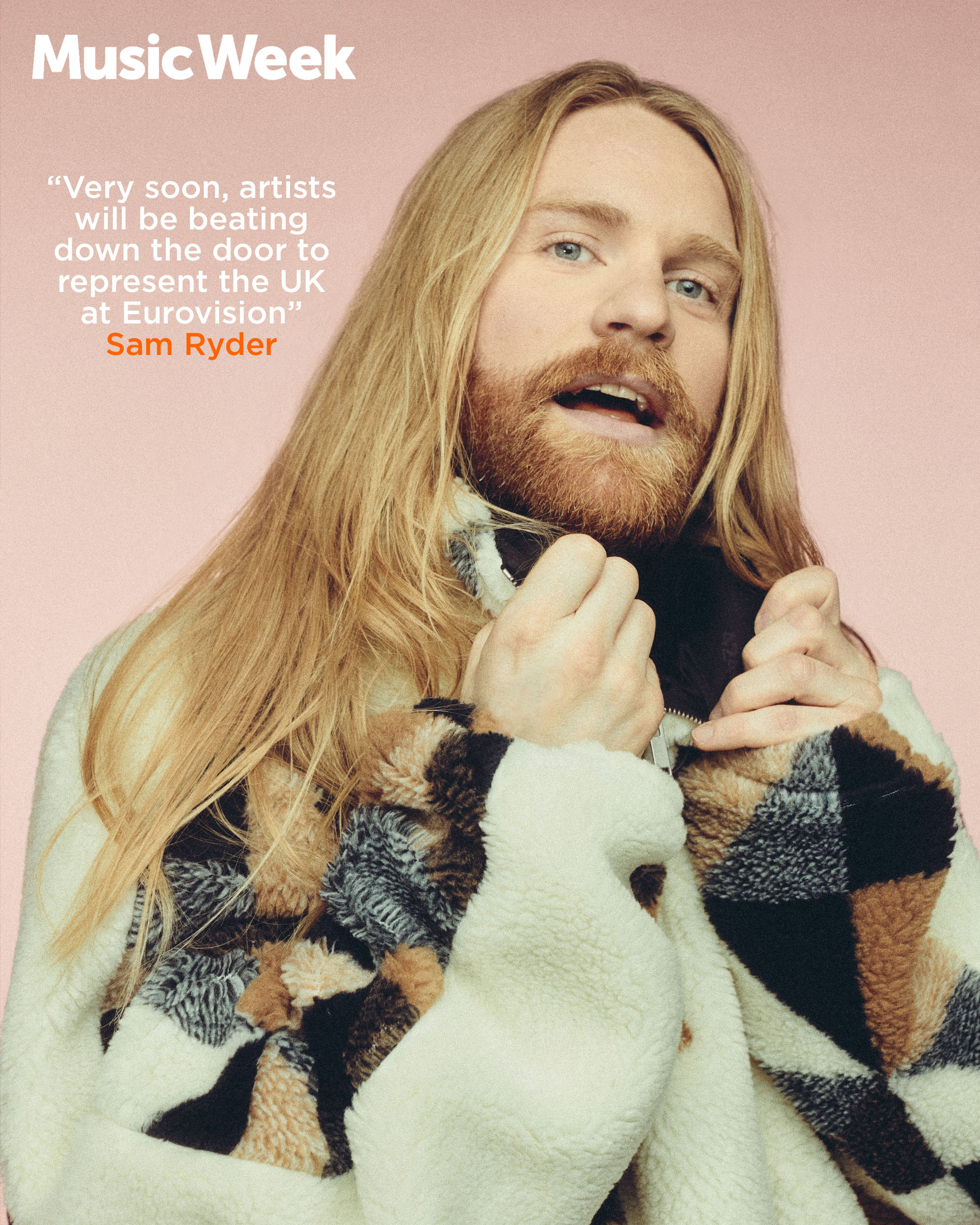
Ryder is deep in the process of making sure he’s equipped to give the big show his best shot, squeezing in a one-to-one with Music Week over Zoom a couple of hours before jetting off to Italy for rehearsals.
“We're just packing my suitcase, I've got some wicked outfits,” he laughs.
The former vegan cafe owner’s music industry career actually stretches back more than a decade to his work as a session musician. But his Eurovision fandom dates back further still.
“My house was always full of music, so a show like Eurovision was always celebrated,” smiles Ryder. “We'd all have tea, get around the telly and watch Eurovision, so it’s a lovely, positive memory of growing up and a tradition I carried on with friends of mine. Anytime Eurovision was on, we'd throw some kind of get together. The food wasn't as good though!”
For the 32-year-old, who is managed by David May, the enormous stage and chance to turn the page on Britain’s 25 years of Eurovision hurt, outweighs any potential pitfalls…
Did you have any reservations about signing up?
Sam Ryder: “If you're a fan of Eurovision, you know the scale and the opportunity – 200 million people watch it – there is nothing like it on earth in terms of a new artist getting their name out there. Of course, a split-second later, the fear and doubts come in like, ‘What if you get nul points?’ Or, ‘What if it ruins your career and you never work again?’ But we can change the narrative of that and go with our gut instinct. I believe my positive outlook will have an effect on my experience and that, if you're positive about something, the situation is better because of it.”
To what extent have you embraced the Eurovision spirit?
“I've already properly got myself stuck into all of the pre-parties. We were playing around London, Amsterdam and Madrid, and the passion that the fans have for Eurovision is wild. I thought I was a fan, but I’ve realised I'm a total dullard because there are levels to the fandom.”
How suitable do you think Space Man is for the contest?
“I think it fits the vibe, but it wasn't written with that in mind whatsoever. Space Man was always a special song to me because it got me my record deal. All the TikTok videos and Instagram videos gave me such an opportunity in lockdown because of people sharing them. But it wasn't enough to get a label to sign me because they're just numbers and labels need more proof in the pudding. I sent Space Man across to the labels that were interested and then the offers came in, so it’s already changed the course of my life and now it gets to have its second life as the Eurovision song for this year, which is so cool.”
Has it been inspiring to watch Måneskin's success since their win?
“I think it should be a carrot to everyone that the landscape of Eurovision is changing and I hope it won’t be long until attitudes in the UK really shift. There is definitely an assimilation of positivity around this year and that's an incredible start. I believe that, very soon, artists will be beating down the door to represent the UK at Eurovision.”
But does the UK’s recent Eurovision record present cause for concern?
“It's the same as me worrying if it's going to rain tomorrow, I just can't control it. I'm going to be present in the moment and focus on the things that I can control.”
Finally, how do you rate your chances?
“I'm just going to do the best I possibly can. Every single day since I said yes, we have done promo. Even now, I'm literally packing my bag to get a flight in two hours. We're doing everything we possibly can and no matter what happens, I want the fans to know that we’ve left no stone unturned.”
As the countdown to the big night continues, Ryder has risen to second favourite with the bookies to win Eurovision outright, in a show of public confidence that bodes well.
“I don't think a UK act has been among the Top 10 favourites for about 15 years, so I'll take those odds quite happily,” says Mitchell. “I believe we have one of the best songs in the competition, genuinely, and I think his performance is going to be very strong on the night, so I'm feeling reasonably confident.”
“Obviously, the higher up that he finishes, the better, and I think he's going to do very well,” finishes Mawson, sharing the optimism. “But can he win it? Yeah, of course he can. But like every competition, that's an element we can't control. He approached it with totally the right attitude of, ‘I don't care about the scoreboard, I just love singing and I want to go out and enjoy the moment in front of a huge audience.’ And I think he's going to do us proud.”
